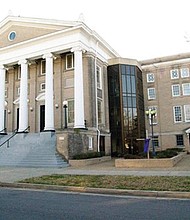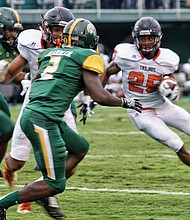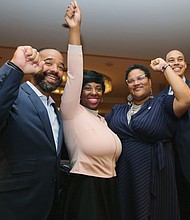Photo

First African Baptist grew out of First Baptist, which was established in 1780 and included African-Americans among its members. In 1841, white members built a …
Published on April 6, 2023
Photo

Virginia State University running back Trenton Cannon carries the ball into Norfolk State University territory during Saturday’s Labor Day Classic at Dick Price Stadium in …
Published on September 7, 2017
Story

Falwell urges students to pack pistols
Liberty University President Jerry Falwell Jr. has urged students to carry concealed weapons on campus to counter any possible armed attack, saying that “we could end those Muslims before they walk in.” “Let’s teach them a lesson if they ever show up here,” Mr. Falwell told students at the private Christian school Dec. 4. His remarks make him the first president of a Virginia college or university to urge students to arm themselves and put him among the first in the country to do so.
Story

COVID-19 cases continue to rise in Richmond area
The counties of Henrico, Chesterfield and Hanover are among the Virginia localities where COVID-19 cases and hospitalizations have risen, as the spread and impact of the virus has increased throughout the Central Virginia area and statewide in recent weeks.
Story

Who would have believed it?, by E. Faye Williams
From the silly to the sublime, to the serious, faster than the mind can cogitate, our societal norms are being manipulated from the “as expected” to the “never in a million years.” Re- flecting on what is presented to the masses daily, I can recall a time when a television se- ries like “The Real House- wives...” could never have been shown, and pimple-pop- ping would have been done in the privacy of one’s own bathroom, but no longer. Frivolity is often the trade- mark of a “who would have believed” event, but now, more often than not, rather than leaving us amused, they leave us shocked and in dismay and disbelief. The current trend in these events has us questioning how we might provide for increased security and safety for our families and ourselves. Who would have believed a time during which the serious- ness of a public health crisis in theformofaglobalpandemic would be denied? Can anyone explain when, in the face of such a pandemic, personal interests and comfort became paramount over the interests of the general state of health? Most assuredly, few people could have anticipated this “denial” state of mind among such large numbers of cases or that the disease would take the lives of more than 900,000 Americans. My bet is that even fewer people could have guessed the massive rejection of life- saving vaccines. In stark contrast to the cur- rent pandemic, the 1950s battle against polio was a lesson in Dr. E. Faye Williams cooperative discipline. With the exception of general mask- ing, Americans practiced ex- treme social distancing. In his book, “Paralyzed with Fear: The Story of Polio,” Gareth Wil- liams wrote, “Fearful of the spread of the contagious virus, (San Angelo, Texas) closed pools, swimming holes, movie theaters, schools and churches, forcing priests to reach out to their congregations on local radio. Some motorists who had to stop for gas in San Angelo would not fill up their deflated tires, afraid they’d bring home air containing the infectious virus. And one of the town’s best physicians diagnosed his patients based on his ‘clinical impression’ratherthantaking the chance of getting infected during the administration of the proper diagnostic test.” When Jonas Salk released his vaccine in 1955, he im- mediately was described as a “miracle worker” and, because he did not patent his vaccine, it was universally welcomed and produced in the United States and the world. Acceptance of his vaccine was so widespread that by1980, polio had been elimi- nated in the United States. One also must ask who would have believed a time in which the history of Black Americans is being openly erased from the curriculum of America’s public schools and from the conscience of the nation? Although barely taught, the instruction of Black history is under assault. It is er- roneously labeled as critical race theory and the new threshold of general acceptance is that it is presented in a manner which does not cause “guilt” or “discomfort” to the listener. Dr. Carter G. Woodson, the father of Black History, said, “Those who have no record of what their forebears have ac- complished lose the inspiration which comes from the teaching of biography and history.” He added, “If a race has no history, if it has no worthwhile tradition, it becomes a negligible factor in the thought of the world, and it stands in danger of being exterminated.” For now, the vigilant see psychologicaleradicationasthe goal. Will the physical follow? I guess nothing should sur- prise us now as people now flock to certain gas stations for dinner! The writer is national presi- dent of the National Congress of Black Women Inc.
Story

Councilwoman hopes proposed changes to City Charter find support
Under proposed changes to the City Charter or constitution, City Council would gain new authority over housing subsidies and real estate tax relief to residents with low to moderate incomes, in addition to setting its own compensation and modi- fying zoning. Fifth District Councilwoman Stephanie A. Lynch hopes to gain unanimous support from her eight colleagues at the Monday, Dec. 11, council meeting for the changes she has negotiated with Mayor Levar M. Stoney’s administration. If passed by the council, the package would be sent to the General Assembly for approval in the upcoming 2024 session. Many of the changes follow recommenda- tions that a council-created Richmond City Charter Review Commission submitted Aug. 2 after a year of study. As the most significant package of charter changes proposed since the 2004 creation of a mayor elected citywide, the amend- ments do not address the current relationship between the council and the mayor ahead of the 2024 elections for the governing body and chief executive. The biggest proposed change could well be the tax and housing initiatives that the charter review commission did not address. The proposed Section 2.09 amendment would allow the city to defer property taxes and tax increases for qualifying low or moderate income property owners, using the definition of such individuals established by the Virginia Housing Development Authority, now known as Virginia Housing. Such a program could allow the taxes to accumulate over time to be paid off from proceeds after the property is sold. In addition, the proposed charter change would authorize the city to create a program that could help such qualifying individu- als buy a home or receive rental subsidies. The city also could use state or federal funds to advance such initiatives. The charter amendment also would declare the creation of programs that could provide funds directly to individuals for housing to be “in the furtherance of a public interest” to get
Story

GOP candidate a ‘wolf in sheep’s clothing’
I was disgusted when I saw the Republican candidate for governor, Glenn Youngkin, surrounded by Black folks at a recent news conference at Virginia Union University.
Story

Playwright aims to open hearts and minds with premiere production
Brittany Fisher left her native Virginia for New York in 2021 to attend Juilliard’s Lila Acheson Wallace American Playwrights Program. Now graduated, she is still based in New York, but she never stays away for long. Her family won’t let her.
Story

Strange fruit?
Critic: Oak evokes lynching image at Walker statue site
The fight over the tree in the planned Maggie L. Walker plaza isn’t over. Gary L. Flowers, a Richmond native and national political and civil rights operative living in Jackson Ward, has jumped into the fray with a petition drive opposing the live oak that now dominates the gateway into Jackson Ward where the monument to the great lady is to stand.
Story

Some striking UAW members carry family legacies
As Britney Johnson paced the picket line outside Ford’s Wayne Assembly plant, she wasn’t just carrying a sign demanding higher pay and other changes. Autoworker jobs have long been a pillar of the Black middle class in America, and the strikes and the fight for higher wages have had even deeper significance for workers like Johnson.
Photo

Thousands of people enjoy the entertainment on the main stage on the oceanfront at 5th Street in Virginia Beach. Tickets for the three-day festival ranged …
Published on May 2, 2019
Photo

Members of the Virginia Legislative Black Caucus cheer the gains made in Tuesday’s election that will boost their membership numbers to 23 when the General …
Published on November 8, 2019
Photo

This 1918, seven-passenger touring car produced by Kline Motor Car Company was part of the fleet owned by A.D. Price, a prosperous Black businessman and …
Published on May 12, 2022
Story

Va. student network criticizes colleges reopening for in-person learning
Virginia students have leveled several criticisms against state colleges that chose to reopen their campuses for the fall semester in the midst of the COVID-19 pandemic.
Story

Schools are trying to get more students therapy. Not all parents are on board
Derry Oliver was in fifth grade when she first talked to her mom about seeing a therapist.
Story

Questions about the COVID-19 vaccine for your child?
The Richmond and Henrico Health Districts offers the following answers:
Photo

Hundreds enjoy the Richmond Symphony’s Big Tent concert series playing at Abner Clay Park in Historic Jackson Ward for the first time Saturday, May 27. …
Published on June 1, 2023
Story

Rare Bible that went to moon up for sale
For the collector who has almost everything, there’s still a chance to own a Bible that literally was out of this world.
Story

Orchestra, museum present sounds of black composers
The Richmond Symphony’s Big Tent concert series comes to Abner Clay Park for the first time on May 27 at 7 p.m. The free event in the recently renovated park features the music of noted black composers such as, Florence Price, Joseph Bologne (the subject of the recent film “Chevalier”), and Virginia resident Adolphus Hailstork.
Story

State NAACP to hold “The Urgency of Now Rally” Feb. 12 at Capitol Square
The Virginia State Conference NAACP is urging people to rally in support of teaching Black history from 11 a.m. to noon Saturday, Feb. 12, at the Bell Tower on the grounds of the State Capitol.





